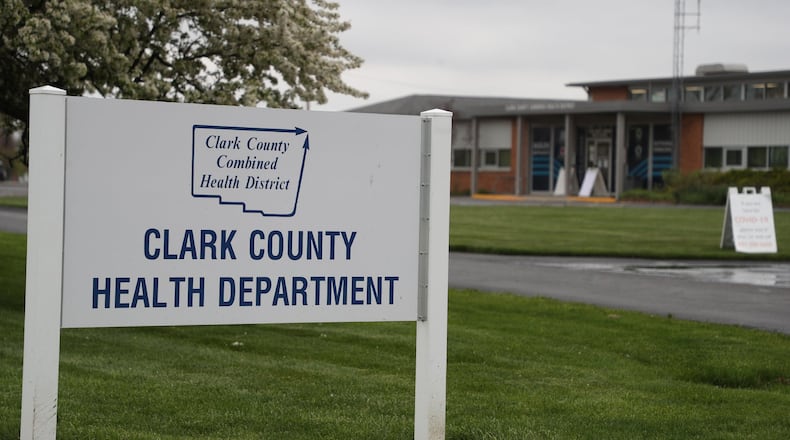The case involves an infant too young to be vaccinated against the disease, said Nate Smith, health district communications coordinator.
The Centers for Disease Control and Prevention recommends children get two doses of the measles-mumps-rubella vaccine, known as the MMR vaccine, starting when the child is 12 months to 15 months, followed by a second dose when the child is between 4 and 6 years.
“Anyone who is not vaccinated from measles has reason to be concerned if they are going to be in any public setting, given how contagious the measles virus is,” Smith said.
Dr. Yamini Teegala, the chief medical officer at Rocking Horse Community Health Center on South Limestone Street, said the health center has been preparing for weeks for measles to show its face in Clark County.
“We knew this was coming. It was a matter of when, not if,” Teegala said.
Taking precautions
Workers at the Springfield health clinic have been talking to parents who call in with children with upper respiratory symptoms and rashes about measles. The clinic has designated rooms for testing that don’t require a patient to travel through the bulk of the clinic, and curbside appointments are also available.
Rocking Horse workers have also been refreshed on transmission control, with training on taking temperatures in the lobby of the clinic and the use of facemasks.
In the Columbus outbreak, 95% of the 64 measles cases were in unvaccinated people, and more than 90% of the cases were in children younger than 6.
Statewide, there have been 77 reported cases of measles since the beginning of the outbreak, including 72 in unvaccinated people and five in people who only received the first of the two-dose MMR vaccine.
Measles is highly contagious and can be spread by children before they start showing symptoms. The virus can live in the air for up to two hours after an infected person leaves the room.
Initial symptoms of measles include a high fever, cough, runny nose and watery eyes, followed by a rash that usually spreads form the head to the rest of the body. Generally, symptoms appear eight to 12 days after exposure.
About one in five children with measles will be hospitalized for complications such as pneumonia, dehydration or brain swelling, which have the potential to be deadly, according to the health district.
There is no treatment for the measles, but a vaccine has been available since 1963. Measles was declared eliminated from the U.S. in 2000, but anti-vaccination sentiment has allowed the virus to reemerge in recent years, the CDC said.
As of a week ago, 25 children in the Columbus-area outbreak had been hospitalized, Columbus Public Health said.
97% protected
Anna Jean Sauter, supervisor for assessment and surveillance at the Clark County Combined Health District, said in a health briefing this month that the health district is recommending families take precautions, including getting vaccinated.
“There’s a couple groups of people who are the highest risk of measles, and that’s children under five, that’s people who are 20 years or older, people who are pregnant, and people who have suppressed immune systems,” Sauter said.
Sauter discussed how effective the MMR vaccine is against preventing the spread of measles, saying an individual is 93% protected after one dose and 97% after two doses.
A Springfield News-Sun investigation found gaps in vaccines among children. The two elementary schools with the area’s largest increase in students whose parents filed moral or religious exemptions are in the Springfield City School District.
At Perrin Woods Elementary School, 17.5% of kindergartners had moral exemptions in the 2021-2022 school year, up from 3.8% the prior school year. At Fulton Elementary School, 11.3% of kindergarteners had moral exemptions in the 2021-2022 school year. The school had no exemptions in the 2020-2021 school year and wasn’t above 5% in the three years before that.
“There has been a growing national trend of vaccine distrust that resulted from the rollout of the COVID-19 vaccines. More and more parents are directly correlating their beliefs about COVID-19 vaccines with routine childhood vaccinations, such as polio or rubella,” said Springfield schools spokeswoman Jenna Leinasars. “It is evident that Springfield is following this wider trend.”
At 14 elementary schools in the region, at least 10% of kindergarteners’ parents or guardians opted them out of getting required vaccines due to religious or moral objections during the 2021-2022 school year, according to new data from the Ohio Department of Health.
Composure, compassion
Teegala said the health clinic has been working with the Springfield City School District to arrange educational sessions for vaccines. Rocking Horse workers plan to be at kindergarten registrations and other events to answer parents’ questions about vaccination.
“You have the composure, the compassion to listen to through their questions and provide recommendations,” Teegala said.
More than just health risks exist when a child is exposed to measles: a disruption in education also occurs, as children will be out of school for more than 21 days.
“You don’t want kids to get such a gap in their education as well,” Teegala said.
The MMR vaccine is available at area pharmacies and through health care providers.
For more information, call the Clark County Combined Health District at 937-390-5600 or email health@ccchd.com.
Staff Writer Samantha Wildow contributed to this report.


